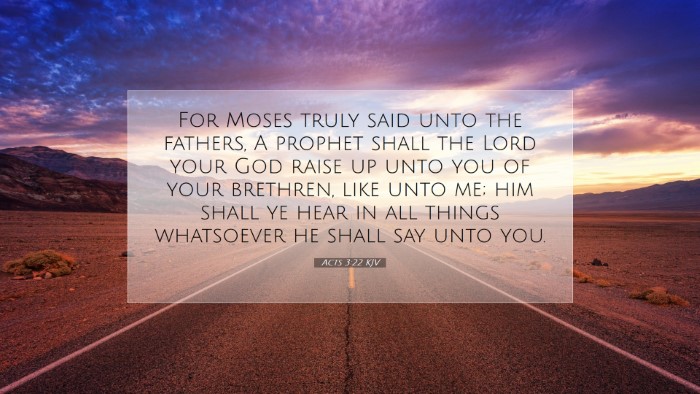Old Testament
Genesis Exodus Leviticus Numbers Deuteronomy Joshua Judges Ruth 1 Samuel 2 Samuel 1 Kings 2 Kings 1 Chronicles 2 Chronicles Ezra Nehemiah Esther Job Psalms Proverbs Ecclesiastes Song of Solomon Isaiah Jeremiah Lamentations Ezekiel Daniel Hosea Joel Amos Obadiah Jonah Micah Nahum Habakkuk Zephaniah Haggai Zechariah MalachiActs 3:22
Acts 3:22 KJV
For Moses truly said unto the fathers, A prophet shall the Lord your God raise up unto you of your brethren, like unto me; him shall ye hear in all things whatsoever he shall say unto you.
Acts 3:22 Bible Commentary
Commentary on Acts 3:22
In Acts 3:22, the apostle Peter quotes Moses, highlighting the prophetic significance of Jesus Christ and His role as the fulfillment of the Old Testament promise. This verse states:
"For Moses truly said unto the fathers, A prophet shall the Lord your God raise up unto you of your brethren, like unto me; him shall ye hear in all things whatsoever he shall say unto you." (Acts 3:22 KJV)
Context and Significance
This verse is situated within Peter's speech to a crowd following the miraculous healing of a lame beggar near the temple. The healing serves as a powerful context for Peter's message about Jesus, demonstrating that the same Jesus whom they condemned is indeed the Messiah foretold.
Connection to Deuteronomy
Peter references Deuteronomy 18:15, where Moses prophesied the coming of a prophet like himself. This connection is significant as it solidifies Jesus' identity as the promised prophet and encourages the Jewish audience to listen to Him. The prominence of Moses in Jewish tradition elevates Jesus' authority as He fulfills the very prophecies and expectations of the people.
Commentary Insights
-
Matthew Henry's Commentary:
Henry emphasizes that Peter's use of the prophetic words of Moses serves to resonate with the Jewish audience. He notes that Jesus is represented as "a prophet" who is both of their brethren and greater than Moses. This establishes that Jesus, though rejected, is to be heard above all. It brings attention to the necessity of obedience to Christ's words, for those who refuse to heed His message will face dire consequences, as Henry indicates in his reflection on the weight of this prophecy.
-
Albert Barnes' Notes:
Barnes elucidates that the reference to "a prophet" indicates not just an ordinary messenger, but a figure wielding authority and instrumental in God’s redemptive plan. He highlights the phrase "like unto me" as pointing to the similarity in the mediatorship of Moses and Jesus, suggesting that just as Moses delivered God's law, so Jesus delivers God's final message of grace. Barnes stresses the necessity for the people to pay heed to Jesus, reinforcing that neglecting Him would result in their spiritual demise.
-
Adam Clarke's Commentary:
Clarke analyzes the Jewish understanding of prophecy and emphasizes that the expectations of a prophet were deeply ingrained in their culture. He makes a critical point that the acknowledgment of Jesus as the fulfillment of this prophecy compels a response from the listeners. Clarke warns of the repercussions of refusing to follow this prophet, stating that those who disobey shall be cut off from their people, thereby implicating the grievous potential of rejecting Christ not only as a prophet but as the Messiah.
Theologians and Pastoral Applications
For pastors and theologians, this verse carries immense theological weight, as it bridges the Old and New Testament understandings of prophecy and fulfillment in Christ. The exhortation within the verse compels a reflection on the authority of Jesus in contemporary preaching and pastoral practice.
Lessons for Preaching
- Preachers should highlight the continuity of God's redemptive plan from the Old Testament to the New Testament and underscore the authority of Jesus in their messages.
- There is an opportunity to address the implications of obedience to Christ's teachings in the lives of believers. As this prophecy indicates, ignoring His words has spiritual ramifications.
- The necessity of treating Jesus not merely as a historical figure or teacher but as the ultimate Prophet of God aligned with the expectations rooted in the Hebrew Scriptures needs to be emphasized.
Lessons for Theological Study
- The verse invites scholarly exploration into the nature of prophecy in the Bible, particularly how New Testament authors interpret Old Testament texts.
- The interaction of prophecy, fulfillment, and messianic expectation within Jewish thought provides a rich field for theological discourse and understanding.
- It fosters examination of Christocentric hermeneutics in Scripture, encouraging scholars to analyze how Christ fulfills the Law and the Prophets.
Conclusion
Acts 3:22 stands as a pivotal moment in the early Christian narrative, compelling both its immediate audience and future generations to recognize and respond to Jesus as the Prophet promised by Moses. This rich interplay of prophecy, fulfillment, and authority provides a fertile ground for preaching, teaching, and scholarly research, challenging believers to heed the call of Christ in all aspects of life and faith.


